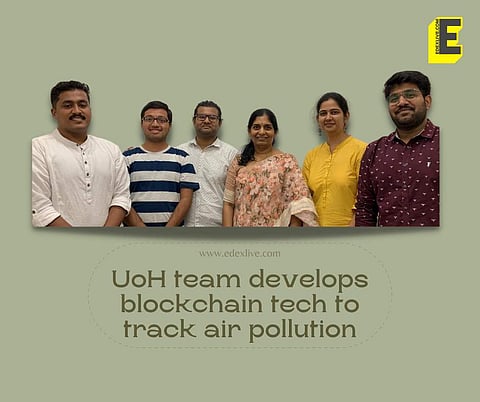

The University of Hyderabad-incubated start-up Inclusive Growth Chain (IGC) has added another feather in its cap by claiming victory at the International Blockchain Hackathon that concluded this week in Dubai.
The team from IGC designed an application that Blockchain technology to collect air pollution data. IGC, which is incubated at the Faculty of the School of Management Studies by Prof Vijay Bhaskar Marisetty and Dr Varsha Mamidi has also been invited by the Governing Committee of the hackathon to adapt its application into a production model prototype.
Prof Marisetty tells Edexlive that the biggest advantage that Blockchain technology adds to the application is the fact that it makes it tamper-proof. "Blockchain functionality ensures that the data of Air Quality Index (AQI) and individual pollutant values is tamper-proof, granular, and traceable and thus, it creates trust and transparency between the service provider and end consumer. For instance, if a user wants to purchase a property in a location and would like to check the pollution data for that area, real estate companies cannot tamper with this data and users can not only check the pollution data but also receive health recommendations," he explains.
The team that won at the Hackathon consisted of students from the MBA Business Analytics programme Prudhvi Krishna and Sneha Sameera, and PhD scholars Shreyansh Nema and Mohammed Muhsin. They were led by Dr Varsha Mamidi. With the vast swathes of data that the technology developed by the team gathered, came the challenge of ensuring accuracy. Converting scales and units of various countries into a uniform value, and getting the map coordinates to match with the pollution parameters of the respective location were the key areas of focus, shares Prof Marisetty.
The prototype they have been invited to work on consists of weather devices powered by Internet-of-Things (IoT) to collect and store air pollution parameters on the cloud. The application can then be used by people to access the air quality status, pollution parameters and health recommendations of their selected location. The engine that this application runs on is the interaction of users, and Prof Marisetty elaborates the more people install air quality sensors for granular data to be accessed by the Blockchain, the better will be the quality of information on air pollution on their application.
In the past, the team has worked on an application for farmers that runs on Blockchain technology to streamline the process of production and sale of crops for the farmers.
